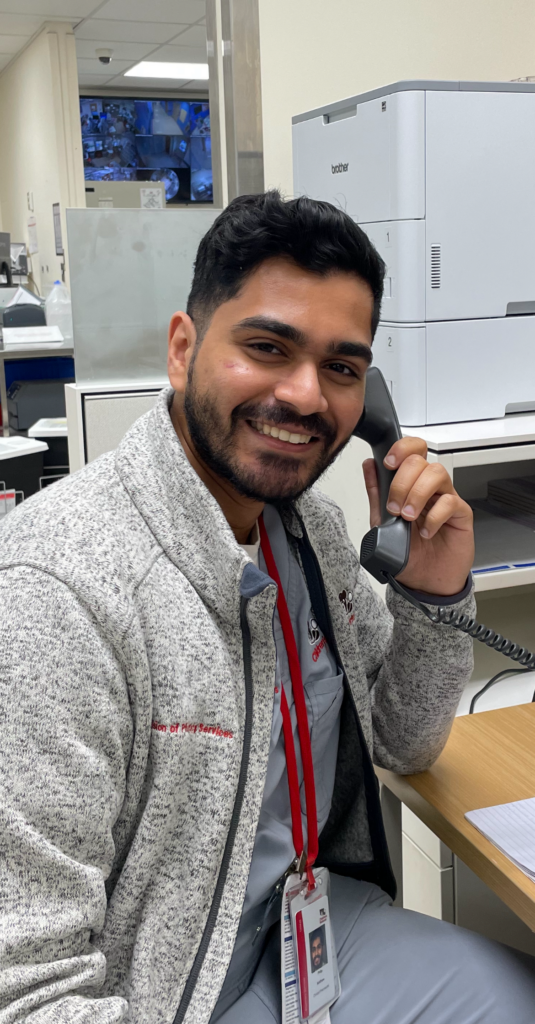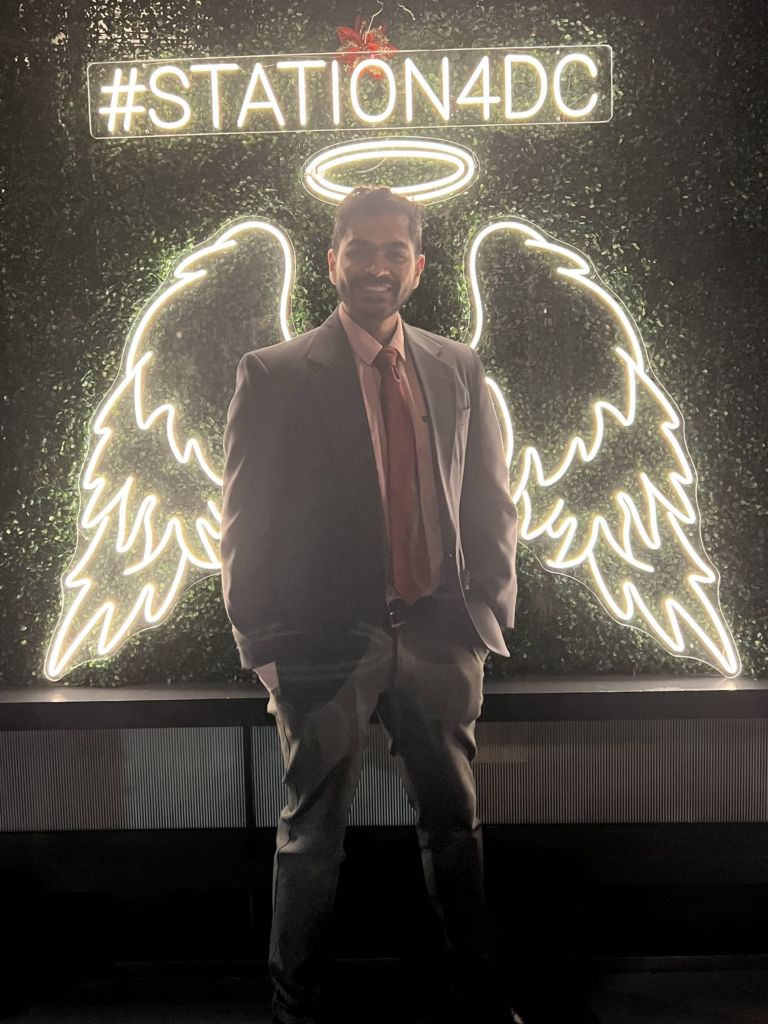As I breathe in the crisp winter air, flavored with the echoes of kindling firewood and holiday spices from the warm coffee-shop next door, I can’t help but reflect on life (and think about my old English creative writing essays 😂).

These days, I feel layers of gratitude:
• Gratitude for my time in DC: I’ve spent countless hours biking, metro-ing, running, and exploring all
around the city.
• Gratitude for the friends I’ve made this year: I’ve met people from so many elements of my life, both here
in DC and across the country.
• Gratitude for my life and my family: I’ve seen how tragically lives have been lost across the world
recently and I recognize my privilege to spend time without worrying for my life.
• Gratitude for the work I’ve done at a hospital: I’ve practiced, understood, and led pharmacy operations
in a clinical setting.
To recap on this last point, my fellowship program has a unique component where I spend six months in a clinical setting, working on different pharmacy operational teams, such as the Vaccine Implementation team or the Administration team. As a newer program, this component’s description was vague when I applied and did not expand much beyond general work at a hospital. Until I was hired, I didn’t even know which hospital I’d be working at within DC! Looking back, I like to think of the work I did as a mix between a project management consultant, a student, and a resident, with an emphasis on the former two roles. I haven’t seen many other medical affairs industry programs with a clinical operations component like this and I want to provide a deeper dive on the experience.
When I learned about my six month rotation at a hospital, I had uncertain feelings. On one hand, I was grateful to finally enter the pharmaceutical industry. On the other hand, I was more than a little anxious that this six month rotation would put me behind on my career goals. Through pharmacy school and especially through rotations, I knew I wanted to pursue a career in medical affairs. Intellectually, I loved having clinical discussions, but never felt connected to direct patient care or work up plans the same way my clinical colleagues did. While I went through the grueling process of applying and interviewing for fellowships, like many people, I was unfortunately not selected for many of my original applications. I know many pharmaceutical fellows are hired in December around this time, but I also know that for every candidate that gets an opportunity, there are countless others who miss out, at least at first. The emotions at that point can be challenging: I went through stages of embarrassment, anxiety, hopelessness, and regret. I won’t lie, it was a rough point.
As an aside, If you’re reading this and are one of those folks, don’t give up! You will find the career that’s meant for you as long as you keep on digging. And if you’re someone who did get a fellowship, congrats to you too!
When I finally did get my position, I was intrigued to learn more about my hospital component. Honestly, I wasn’t sure if I’d end up back on the ICU floor, rounding with the physicians and scrambling to remember my heart failure or MRSA pharmacotherapy pathways – flashbacks to my ICU rotations where I felt like I knew less every day 😮. Kudos to those who enjoy that life haha. Turns out, these rotations did not focus too much on direct pharmacotherapy. I spent the first few weeks in technician training, reviewing basic inpatient pharmacy operations, then quickly pivoted into structured rotations, each lasting four weeks. I rotated in Investigational Drug Services, Pharmacy Administration, Vaccines, 340B and Drug Pricing, and finished out with additional general pharmacy operations, with a little bit of RPh training. As most people who rotate at a hospital focus on building clinical skills, it was a little challenging at times both for the hospital staff and for us as fellows to connect our industry goals with the needs of the department. However, there were moments from each rotation that provided valuable growth, both clinically and in the scope of medical affairs. For instance, during my time with the Vaccines team, I was able to analyze and provide solutions toward a strategy for one of their vaccine rollouts – this connected closely with my future work in the pharmaceutical industry. I was also able to review various scientific articles and practice skills in medical writing, journal analysis, and financial drug pricing. On top of all of this, I earned licensure both in Pennsylvania and Washington DC (the DC Pharmacy Law exam is so awful 😣). Thanks to this, I was able to verify prescriptions and practice some hospital staffing!

In looking back on these rotations, I see a lot of professional development opportunities. Here are some skills I’ve identified that have helped develop my professional brand while working at the hospital and beyond.
1. Teamwork and Accountability
I was not alone in my fellowship. I worked both with my co-fellows and with various teams at the hospital. It was great to connect with co-workers from diverse walks of life and support each other in our roles. However, teams that do not effectively communicate or support each other quickly fall apart: this also happened at times. While the majority of the folks at the hospital provided a professional and positive attitude, there were individuals who occasionally brought negative energy. We’ve all worked with people like this and sometimes we’re guilty of being this person. This is where accountability in teams went so far. I found that by holding myself and my teammates accountable for our work, we would collectively make a bigger impact on both the rotation projects and the hospital staff. Accountability becomes apparent in the little things, like responding timely to emails or communicating progress on a report. Accountability is an underrated skill – I first learned about the importance of this skill back in my undergrad Orientation Leader days, and I still think about how accountability impacts my workflow and my perspective. To me, accountability is more than just being responsible: it’s taking ownership and building respect across my work and my team. These two skills have been and will continue to be extremely important for my growth in the future.
2. Adapatability
As I mentioned previously, I didn’t know what to expect coming into this rotation. While there’s been a decent amount of structure, I’ve also helped shape how the work I’ve done can become more tailored to my goals. Likewise, I’ve been adaptable and open to new projects, ideas, or experiences. It’s through this perspective that I came to the hospital component with a positive attitude and a willingness to learn. Six months is both a long time and a very short time. It can feel long when the work is unfulfilling or disconnected; conversely, it can fly by when the work feels relevant and impactful. This is where ambition comes into play.
3. Ambition
I could argue that the biggest takeaway from the hospital component is this: it’s what you make of it. I’m passionate and driven to make an impact in the work I do and this mentality has helped me immensely here. Even if I didn’t see myself working long-term in a given rotation, I emphasized and made connections where I could to show enthusiasm and engagement with the people. To bring in some existentialism, I believe that an ambitious attitude creates meaning, especially behind work you may not pursue or consider in the long term. To quote the famous existentialist Kierkegaard, “the crucial thing is to find a truth which is truth for me, to find the idea for which I am willing to live and die.” It was often not the work itself that brought the most meaning; it was the connection and impact to other people that the work allowed that had brought me the most value and joy at the hospital.

Now that it’s over, I am truly excited to move on in my career with these skills. Work becomes meaningful when I can connect my values to the values of the company or team. As I develop my professional brand further in my corporate role, I know these experiences will guide my sense of self even more. I hope that wherever your career takes you, you also find ways to connect your values to your work. Always remember the big picture and balance that with your day-to-day activities. It makes a world of a difference, both for you and for those around you.
I hope you all have a great holiday season and take some time to reflect on your own life. What’s something you’re grateful for? I’d love to see your thoughts in the comments!
If you’re one of my new friends from this year, I hope we’ll cross paths again!
Further Reading: